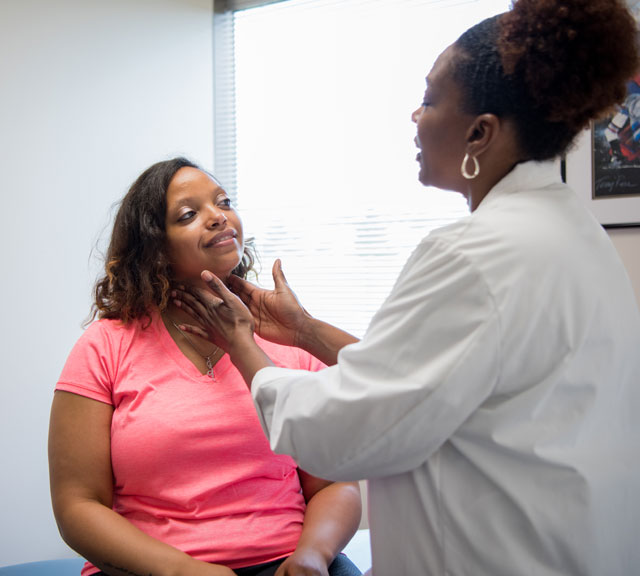Thyroid Surgery: Before, During and After

Find Your Perfect Match
Answer a few questions and we'll provide you with a list of primary care providers that best fit your needs.
Your thyroid sits in the front of your neck below your voice box. When this powerful little gland hums along doing its job, it produces the hormones that regulate many body processes. So if the humming gets out of tune, you’ll know it. Some thyroid disorders are serious enough to warrant surgery, such as:
- You have a lump (called nodule) on your thyroid that should be tested for possible cancer
- You have been diagnosed with thyroid cancer
- You have a lump or goiter that makes it hard to swallow or breathe, or that you want removed for cosmetic reasons
- You have a lump that results in your thyroid not producing hormones like it should
Some thyroid disorders are serious enough to warrant surgery.
Regardless of the reason for your surgery, the initial steps are the same. You’ll be asked to fast for 12 hours or so. Before the surgery begins you’ll receive general anesthesia through an IV to help you sleep and stay pain free during the surgery.

Once you’re asleep, the surgeon will make a small horizontal cut in the front of your lower neck. The extent of the surgery will depend on what your surgeon finds. If the surgery is for cosmetic reasons, she may simply remove the lump or goiter. As a precaution, the lump/goiter will probably be tested for cancer.
In other instances your surgeon may need to remove part or all of your thyroid. The most common reasons are for the treatment of hyperthyroidism, Grave’s disease or thyroid cancer.
If your surgeon removes only part of your thyroid, it is possible that what remains will produce all the hormone you need, and you won’t need to take hormone replacement. But if your entire thyroid needs to be removed, you will definitely need to take lifelong medication – typically a once-a-day pill – to replace those missing hormones.
Most patients go home the same day as the surgery and are able to eat and drink small amounts. You’ll probably be asked to avoid strenuous physical activity for a few days, but can otherwise resume normal activity the next day. At a follow-up appointment your doctor likely will do a blood test. If your doctor removed your entire thyroid, the blood test will determine if you are receiving the proper amount of hormone replacement. If you still have a full or partial thyroid gland, the blood test will verify that your thyroid is producing enough hormone. If not, your doctor may prescribe a small dose of hormone replacement.
Find Your Perfect Match
Answer a few questions and we'll provide you with a list of primary care providers that best fit your needs.
Source: Hormone Health Network; American Thyroid Association; Premier Health

